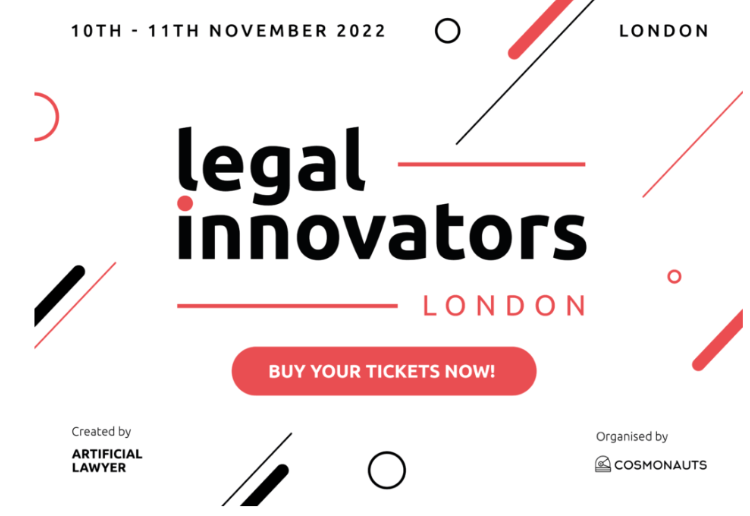
This week’s Legal Innovator Profile is with Greg Baker, Global Head of Practice Innovation at Linklaters.
– When did you first hear the term ‘legal tech’ and what did you think at the time?
Back in 2017-18 I was working as a bank finance lawyer and searching for technical solutions to common problems at the time – for example collaborating on reviewing large document sets across multiple teams (in this case Non-Performing Loans portfolio reviews) and collaborating on complex funds flow diagrams – and I started researching tools outside of the existing VDR solutions and Excel.
After a particularly long night submitting document requests and other Q&A items via loosely-formatted Excel files, I jumped at the chance of engaging with this emerging network of existing and new technologists creating tools for lawyers and allied professionals.
At the time, as I do now, I tend to refer to tools and technologies as ‘Tech’ rather than ‘legal tech’ – in many cases lawyers don’t see the distinction and in fact once something becomes firmly established, it’s no longer ‘legal tech’ and is just technology!
– What is your role now?
I head up Linklaters’ Practice Innovation group, which is a combination of embedded practice-aligned innovation lawyers (all with a legal background) and a centre of excellence for programme management and delivery.
As well as leading the group and chairing our Innovation Steering Group of partners and executives, I ensure we are adopting an open innovation mindset and harnessing not just pioneering ideas from our brilliant staff but also from our clients, academia and other industries.
We curate ideas from across that network and establish solutions – which could be piloting, purchasing and adopting a piece of technology (e.g. Atticus, Structureflow), collaborating with a third party to co-create a solution (e.g. MFNiQ) or resourcing the development of an entirely new workflow, process or solution (e.g. LinkRFI or our Dawn Raid application).
– Why did you move into this field, (if this is not the only field you’ve worked in)?
I started my working life as an analyst at an investment bank, building financial models for LBOs and writing business cases. I moved across to the legal side when I developed a greater interest in the nuts and bolts of executing transactions – the financing to fund an acquisition, or bringing the parties together to develop a new airport terminal.
But throughout my life, from building my own PC at 16 to creating a number of websites when I grew out of GeoCities, I’ve been a technologist with a keen interest in automation and efficiency. I now have the perfect role to be able to bring that passion to my working experience.
– What is the most rewarding aspect of your job?
When unlocking that creative or innovative mindset leads to a fundamental improvement in the way we deliver our services. It doesn’t have to be ground-breaking technology or a complete rewrite of the way we do a piece of work, but a consistently adopted improvement to the way we deliver is extremely satisfying – because I know the amount of work that goes into achieving that!
Whether it’s achieved via design-thinking led workshops and a 6-month development project or it’s being in the right place at the right time to suggest a small improvement or tool from our tech workbench, it’s rewarding to see that moment of delight when someone realises that yes, there IS a better way. A great example is Linkathon, the student hackathon we ran earlier this year, where 75 students and lawyers came up with a range of ideas, large and small, for the leading law firm of the future. The enthusiasm from the students and from Linklaters lawyers for the initiative was inspiring and we have ideas from the event in our innovation pipeline which will continue to improve the lawyer experience.
– If you looked into a crystal ball, how much do you think the everyday practice of law will change in the next five to ten years?
As others have said, on the whole we’re looking at incremental change – sometimes it’s ‘blink and you’ll miss it’ stuff – but we’re seeing:
- The use of automation (whether document, RPA or workflow) growing all the time as our staff understand its capabilities and we get better at deploying it
- The acceptance of task/project/matter management tools become the way we work together – and that could be Litera Transact or Monday.com!
- The huge increase in CLM and other contract management capabilities which treat our documents and advice as not only functional but data-rich and worthy of careful curation and re-use
– If you had one gripe about legal tech companies what would it be?
It’s not a gripe and more a recommendation (perhaps I should write a list of these) – always be ready to demo!
It might be billed as a pre-sales call, or an exploratory chat, but if I’ve got a partner on the call who has submitted an idea and your product might be the solution, this could be your one shot to grab their attention!
– If you had one thing you’d really like to applaud legal tech companies for, what would it be?
Their persistence and fortitude! Selling to law firms is not always easy and I appreciate the time taken to explain your products, establish fit in our tech workbenches and ultimately get us comfortable enough to pilot & hopefully purchase.
– And finally, what advice would you give to anyone wanting to get into this field?
For the lawyers looking to move into this field, find out what your ‘and’ is. I’m a finance lawyer AND have a keen interest in data and automation. You might be an M&A lawyer AND have a passion for design thinking. Another might be a litigation paralegal AND have an aptitude for training ML models. Your ‘and’ can make you stand out and help you find your perfect role.
For the start-up founders, think about user experience early on. No matter how good the underlying product is, I see a dramatic difference between those with a user-friendly predictable user interface and those without. I know that’s hard as UI can be expensive, but do take the time to at least wireframe a consistent & delightful user experience.
Thanks Greg! Very useful points to consider for those working in law firms or inside legal tech companies.
—
Legal Innovators UK Conference – London, November 10 + 11
Greg and plenty of other experts will be speaking at the Legal Innovators UK Conference – in London, November 10 + 11
If you found the topics covered in this article of interest then come along to the landmark two-day legal innovation conference in London. Day One: Law Firms and ALSPs, Day Two: Inhouse and Legal Ops. We have a fantastic line-up of speakers from across the legal and legal tech ecosystems for this event focused on learning, sharing and networking. See you there!
Tickets and more information can be found here.
